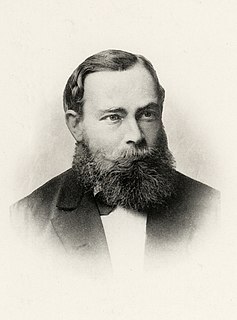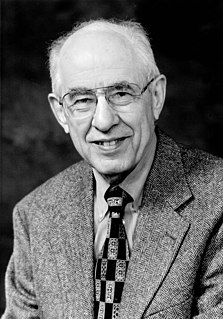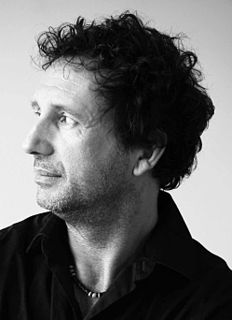Truth is the property of being in accord with fact or reality. In everyday language, truth is typically ascribed to things that aim to represent reality or otherwise correspond to it, such as beliefs, propositions, and declarative sentences.

Friedrich Ludwig Gottlob Frege was a German philosopher, logician, and mathematician. He worked as a mathematics professor at the University of Jena, and is understood by many to be the father of analytic philosophy, concentrating on the philosophy of language, logic, and mathematics. Though he was largely ignored during his lifetime, Giuseppe Peano (1858–1932), Bertrand Russell (1872–1970), and, to some extent, Ludwig Wittgenstein (1889–1951) introduced his work to later generations of philosophers. In the early 21st century, Frege was widely considered to be the greatest logician since Aristotle, and one of the most profound philosophers of mathematics ever.

Hilary Whitehall Putnam was an American philosopher, mathematician, and computer scientist, and a major figure in analytic philosophy in the second half of the 20th century. He made significant contributions to philosophy of mind, philosophy of language, philosophy of mathematics, and philosophy of science. Outside philosophy, Putnam contributed to mathematics and computer science. Together with Martin Davis he developed the Davis–Putnam algorithm for the Boolean satisfiability problem and he helped demonstrate the unsolvability of Hilbert's tenth problem.

Thomas Nagel is an American philosopher. He is University Professor of Philosophy and Law, Emeritus, at New York University, where he taught from 1980 to 2016. His main areas of philosophical interest are legal philosophy, political philosophy, and ethics.

John Henry McDowell is a South African philosopher, formerly a Fellow of University College, Oxford and now University Professor at the University of Pittsburgh. Although he has written on metaphysics, epistemology, ancient philosophy, and meta-ethics, McDowell's most influential work has been in the philosophy of mind and philosophy of language. McDowell was one of three recipients of the 2010 Andrew W. Mellon Foundation's Distinguished Achievement Award, and is a Fellow of both the American Academy of Arts & Sciences and the British Academy.
Crispin James Garth Wright is a British philosopher, who has written on neo-Fregean (neo-logicist) philosophy of mathematics, Wittgenstein's later philosophy, and on issues related to truth, realism, cognitivism, skepticism, knowledge, and objectivity. He is Professor of Philosophy at New York University and Professor of Philosophical Research at the University of Stirling, and taught previously at the University of St Andrews, University of Aberdeen, Princeton University and University of Michigan. TheBestSchools.org has included Crispin Wright within the 50 most influential living philosophers.
In philosophy and logic, a deflationary theory of truth is one of a family of theories that all have in common the claim that assertions of predicate truth of a statement do not attribute a property called "truth" to such a statement.
Scott Soames is an American philosopher. He is a professor of philosophy at the University of Southern California, and before that at Princeton University. He specializes in the philosophy of language and the history of analytic philosophy. He is well known for defending and expanding on the program in the philosophy of language started by Saul Kripke as well as being a major critic of two-dimensionalist theories of meaning.
John Earman is an American philosopher of physics. He is an emeritus professor in the History and Philosophy of Science department at the University of Pittsburgh. He has also taught at UCLA, the Rockefeller University, and the University of Minnesota, and was president of the Philosophy of Science Association.
Hans D. Sluga is a German philosopher who spent most of his career as professor of philosophy at the University of California, Berkeley. Sluga teaches and writes on topics in analytic philosophy as well as on political philosophy. He has been particularly influenced by the thought of Gottlob Frege, Ludwig Wittgenstein, Martin Heidegger, Friedrich Nietzsche, and Michel Foucault.
Hartry H. Field is an American philosopher. He is Silver Professor of Philosophy at New York University; he is a notable contributor to philosophy of science, philosophy of mathematics, epistemology, and philosophy of mind.

Stephen Roy Albert Neale is a British philosopher and specialist in the philosophy of language who has written extensively about meaning, information, interpretation, and communication, and more generally about issues at the intersection of philosophy and linguistics. Neale is a Distinguished Professor of Philosophy and Linguistics and holder of the John H. Kornblith Family Chair in the Philosophy of Science and Values at the Graduate Center, City University of New York (CUNY).
In semantics, philosophy of language, metaphysics, and metasemantics, meaning "is a relationship between two sorts of things: signs and the kinds of things they intend, express, or signify".

In analytic philosophy, philosophy of language investigates the nature of language, the relations between language, language users, and the world. Investigations may include inquiry into the nature of meaning, intentionality, reference, the constitution of sentences, concepts, learning, and thought.

Michael Devitt is an Australian philosopher currently teaching at the City University of New York in New York City. His primary interests include philosophy of language, philosophy of mind, metaphysics and epistemology. His current work involves the philosophy of linguistics, foundational issues in semantics, the semantics of definite descriptions and demonstratives, semantic externalism, and scientific realism.

Quietism in philosophy sees the role of philosophy as broadly therapeutic or remedial. Quietist philosophers believe that philosophy has no positive thesis to contribute, but rather that its value is in defusing confusions in the linguistic and conceptual frameworks of other subjects, including non-quietist philosophy. For quietists, advancing knowledge or settling debates is not the job of philosophy, rather philosophy should liberate the mind by diagnosing confusing concepts.
Antiphilosophy has been used as a denigrating word but is also used with more neutral or positive connotations as an opposition to traditional philosophy.

Jonathan Westphal is an academic working on the philosophy of mind, metaphysics, philosophy of science, logic and philosophy of language and aesthetics. More recently he has become interested in issues in the philosophy of time, and in the understanding of human freedom. In the history of philosophy, he has worked mostly on Wittgenstein and Leibniz. He lives in Hamden, Connecticut, and works as a private tutor in philosophy (jonathanwestphal.wordpress.com)
Tim William Eric Maudlin is an American philosopher of science who has done influential work on the metaphysical foundations of physics and logic.

The New York University Department of Philosophy is ranked 1st in the US and 1st in the English-speaking world as of the most recent edition of the Philosophical Gourmet Report from 2021. It is also ranked 1st in the world by the 2021 QS World University Rankings, and is internationally renowned. It has particular strengths in epistemology, history of philosophy, logic, metaphysics, moral and political philosophy, philosophy of language, philosophy of logic and philosophy of mathematics, and philosophy of mind. The department offers B.A., M.A., and Ph.D. degrees in philosophy, as well as a minor in philosophy and a joint major in language and mind with the NYU Departments of Linguistics and Psychology. It is home to the New York Institute of Philosophy, a research center that supports multi-year projects, public lectures, conferences, and workshops in the field, as well as outreach programs to teach New York City high school students interested in philosophy.









